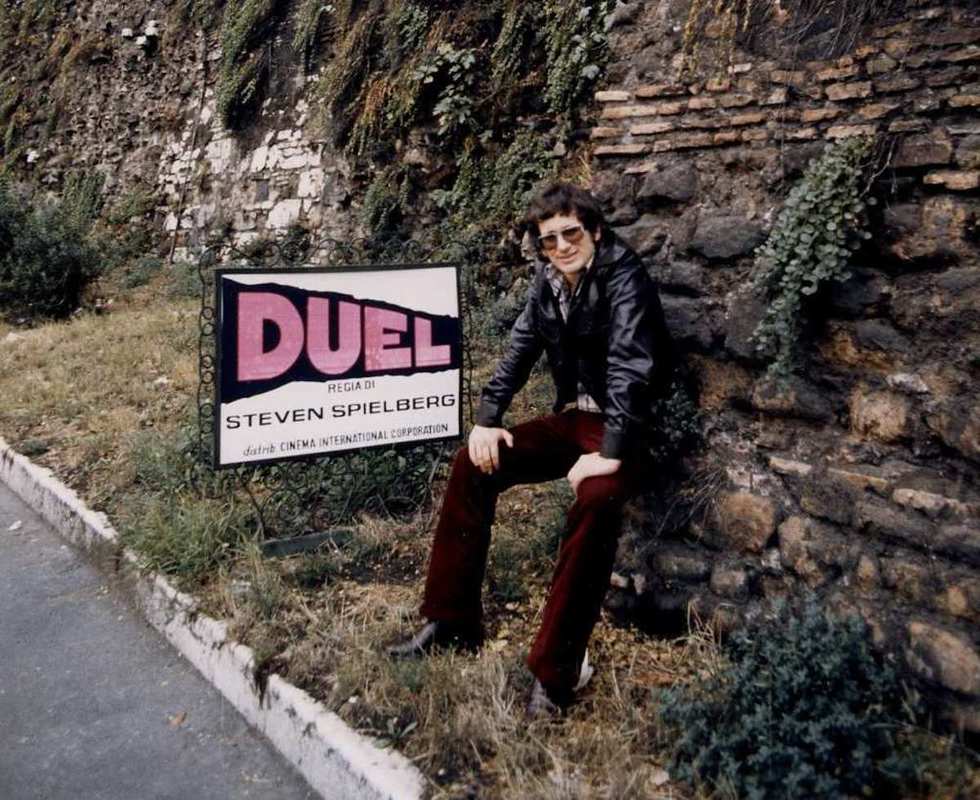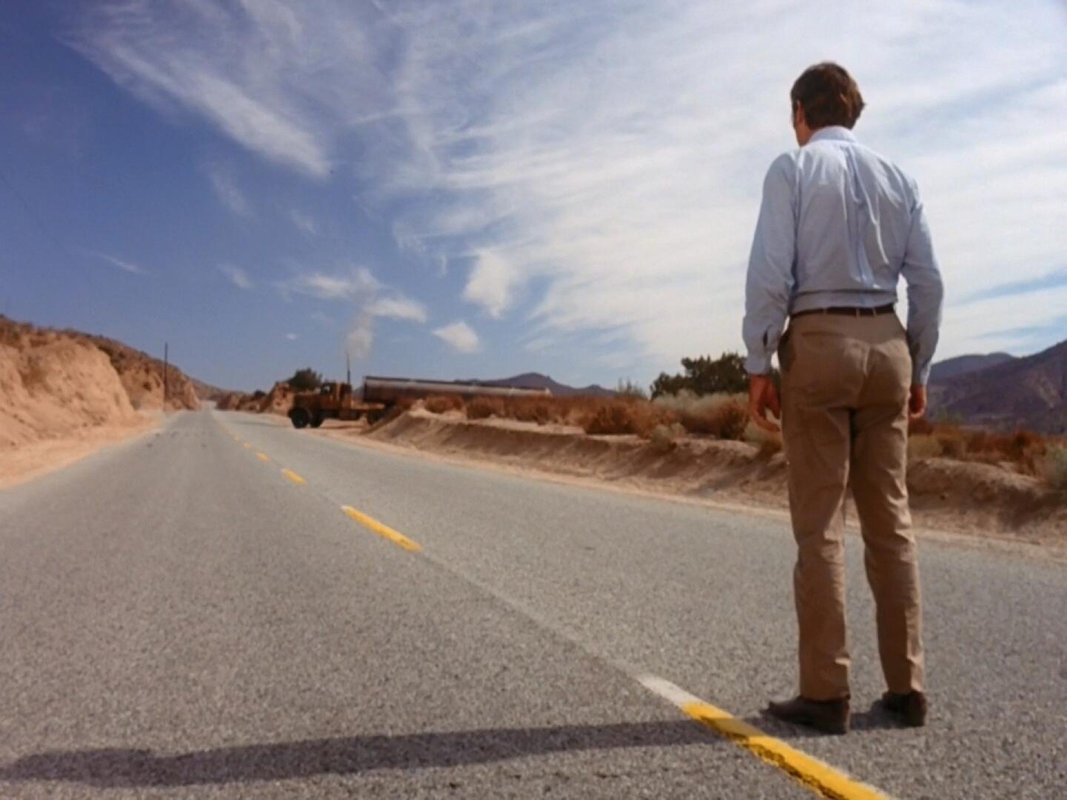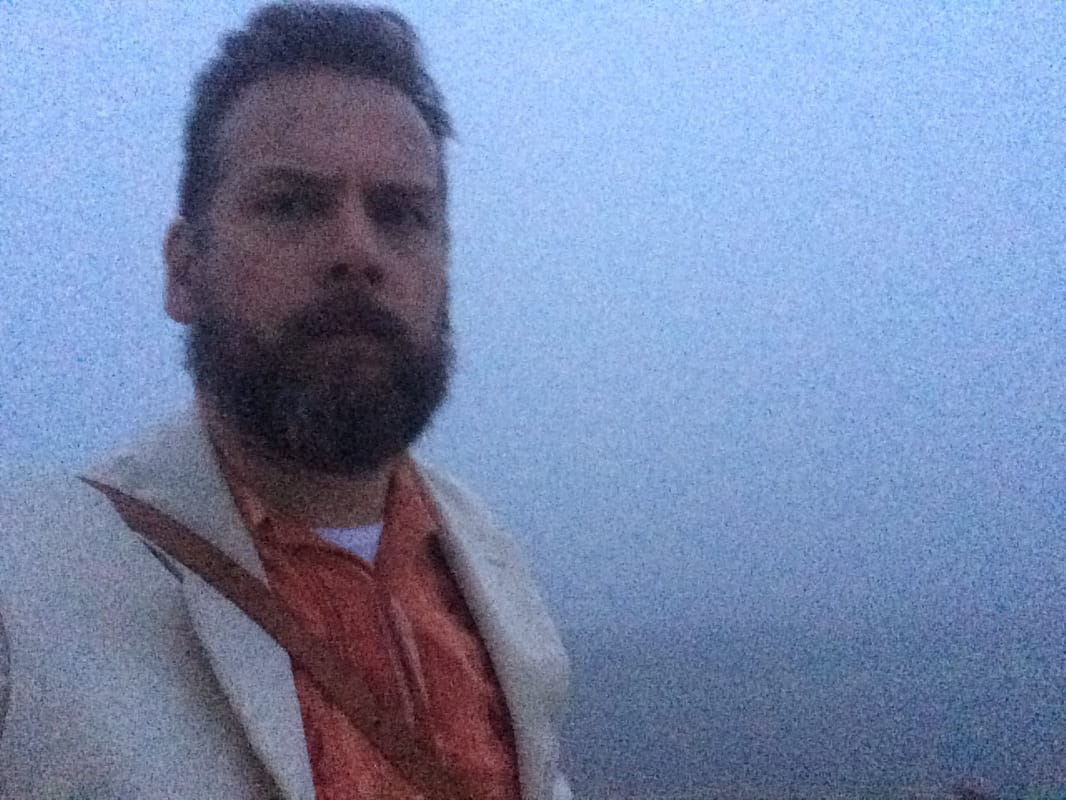|
TV movies come with their own constraints. The budget is low; the schedule, tight and the ambition, narrow. Steven Spielberg got his shot with a Richard Matheson script based on Matheson's own experience driving home from a golf game the day JFK was shot. But Duel broke through a ten day shoot and the threat of Gregory Peck - his casting would have seen Spielberg booted off the project - to become one of the best TV movies ever made. Duel starts with the car's POV as we drive through a city towards the freeway. On the radio, a comedian (Dick Whittington) prank calls the census. He's bothered because although he's 'the man of the house', he doesn't think he's the head of house and he doesn't know what to put. Right from the get-go we have this idea of male insecurity, anxiety that the thin veneer of civilisation is a vaporous illusion. The allegorically-named David Mann (Dennis Weaver) is the perfect foil. A familiar TV face, Weaver's one notable film credit was a ludicrously over the top motel janitor in Orson Welles' Touch of Evil. Everything about him is unattractive: his stupid sunglasses with lenses the colour of urine, his sub-Burt Reynolds mustache and his whiny voice-over voice. His wife complains about him not standing up to another man at a party who was 'practically raping' her. He suspects the mechanic of trying to con him with talk of a new radiator hose. His appointment is with a man who has to leave for Hawaii. You suspect David is never going to Hawaii. The 1955 Peterbilt Truck that will terrify Mann and chase him across the mountains and through the desert is everything that he is not. It's dirty, where Mann dabs at his neat mustache with a napkin, spewing foul smoke. It's assertive where Mann is deferential. It seeks conflict. It's industrial and working class compared to Mann's office stiff wardrobe and monogrammed briefcase. And whereas Mann is the embodiment of male anxiety, the Peterbilt is basically a large cock on ten wheels, loaded with the number plates of previous victims.
The conflict escalates with a black sense of humour. What is apparently a misunderstanding and then vindictiveness, slowly escalates into a deadly hunt. The relative sizes of the Plymouth and the truck, the speeds and the road are expertly conveyed. This is Mad Max level brilliance and yet was filmed in 13 days (three days over schedule) and on location against the wishes of a studio who wanted the whole thing done on a sound stage with back projections. Along the way Mann meets up with a variety of grotesques who show for the first time Spielberg's vision of a banally-indifferent-when-not-actually-corrupt America. These are the same people who will want to keep the beaches open because it's the Fourth of July weekend. Mann's stop at a roadside eatery is full of menace. Any of these people could be guilty and Mann hasn't the confidence to just say to the room "Hey, who's driving that rig out there?" Of course, he picks on the wrong guy - mostly every decision Mann makes is frustratingly obviously wrong. Mann takes plot-convenience naps and is blissfully unaware, until the last second, that a massive truck is heading for his phone box. Weaver's performance is obviously what Spielberg wanted - he was a huge fan of Touch of Evil - but you can't help but wonder what Richard Dreyfuss would have done with the part. Just how much the world is in sympathy with the truck and out of sympathy with Mann is hit home again and again. From the clientele of the truck stop to the school bus driver, everyone seems to distrust Mann and be indifferent to the Peterbilt. The funniest example of this is the woman with the rattlesnake ranch right next to the phone box - 'What a weird place to keep snakes!' Mann exclaims. (By the way look in the reflection of the phone box and you can see Steven Spielberg standing beside the cameraman and watching the scene. Charitably we could say this is his Hitchcockian cameo for what is essentially a Hitchcockian thriller, something the score is relentless in pointing out.) Stripped of all help and isolated, Mann must face the truck alone. The final showdown is expertly conveyed. Shot from multiple angles with seven cameras, Spielberg ended up only using the one shot in slow motion for the climactic crash and cliff dive. It is this kind of decisive restraint that marks him out as a director of genuine vision, even so early on. The way we have read 'Inflammable' on the back of the truck all this time, but then it doesn't explode when it goes over the cliff. This is 1971 so endings always have to have a hint of the ambiguous rather than the audience-pleasing catharsis. Duel got good ratings and reviews as TV Movie of the Week and ultimately some re-shoots to make it feature length. Spielberg used it as his calling card, touring it round festivals in Europe. It was a TV movie that looked like it should be on the big screen. And that was exactly where Steven Spielberg was heading.
0 Comments
Leave a Reply. |
AuthorJohn Bleasdale is a writer. His work has appeared in The Guardian, The Independent, Il Manifesto, as well as CineVue.Com and theStudioExec.com. He has also written a number of plays, screenplays and novels. Archives
March 2019
|


 RSS Feed
RSS Feed


